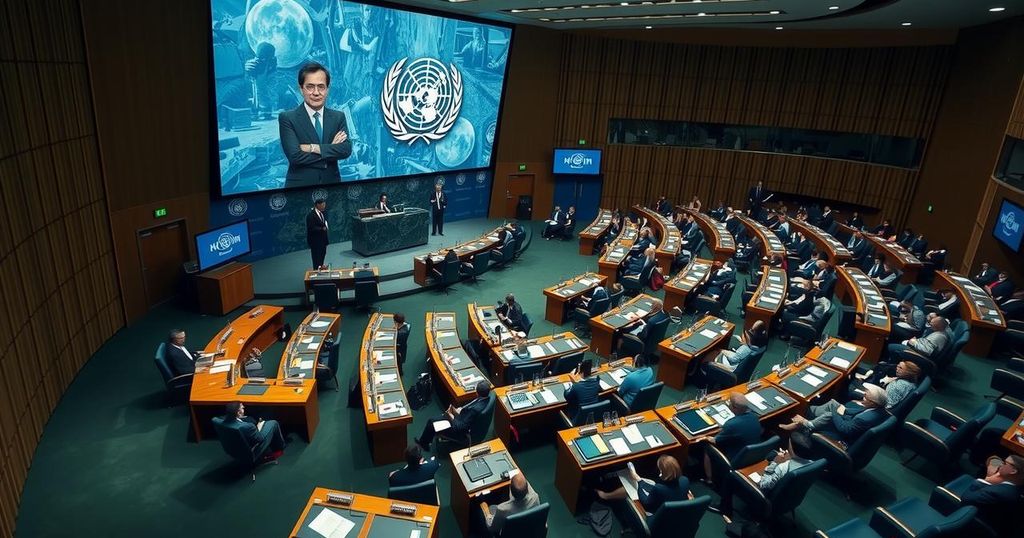The recent UN climate summit in Baku resulted in a contentious deal requiring developed nations to pledge $300 billion annually by 2035 to assist developing countries in combating climate change. Despite this commitment, many developing nations expressed disappointment, labeling the amount as insufficient for addressing urgent environmental challenges. The negotiations highlighted deep tensions regarding financial responsibilities for climate action and the necessity for more effective support mechanisms for vulnerable nations.
At the UN climate summit in Baku, Azerbaijan, a contentious deal emerged, committing developed nations to contribute a minimum of $300 billion annually by 2035 to assist developing countries in reducing greenhouse gas emissions and preparing for climate disasters. However, this agreement faced immediate backlash from poorer nations, which deemed the financial pledge as insufficient given the existential threats they confront from climate change. After extensive negotiations lasting nearly two weeks, the deal was finalized at an early morning session involving nearly 200 countries. Developing nations, represented notably by India, expressed their dissatisfaction, arguing the agreed sum fails to meet the challenges posed by climate change. “It’s a paltry sum,” stated India’s delegate, Chandni Raina, emphasizing that the agreement does not adequately address their needs.
The criticism continued with Sierra Leone’s climate minister, Jiwoh Abdulai, characterizing the deal as indicative of a “lack of goodwill” among developed countries like the United States and members of the European Union. Other developing nation representatives echoed the discontent. Tina Stege, climate envoy for the Marshall Islands, noted, “It isn’t nearly enough, but it’s a start,” highlighting her mixed feelings about the agreement. Disappointment was widespread among the Alliance of Small Island States, Least Developed Countries, and the African Group of Negotiators, prompting calls for more significant and effective climate financing.
These negotiations took place amid rising global temperatures and increasing climate-related disasters, wherein many developing nations had initially sought a pledge of at least $500 billion. The final sum represented a compromise after drawn-out discussions, and various stakeholders, including UN climate chief Simon Stiell, acknowledged the imperfection of the deal. Even though developed nations were under significant political and fiscal constraints, the $300 billion commitment was an upgrade from an earlier $100 billion pledge, yet still seen as insufficient by critics.
The agreement culminated in an ambitious goal of $1.3 trillion per year to tackle climate impacts, with a substantial portion expected to stem from private sector participation, leaving developing nations with a pressing need for more actionable support. Experts have underscored that developed countries should be contributing at least $390 billion annually for effective climate relief and adaptation for developing nations. As sentiments of disillusionment linger among developing countries, the future of global climate finance remains uncertain, especially with upcoming political shifts in major economies that threaten to alter commitments to climate action.
The UN climate summit in Baku saw intense negotiations among nearly 200 nations focused on financial commitments from developed to developing countries to address climate change impacts. The urgency to escalate funding arises from the alarming frequency of natural disasters and the increasing vulnerability of poor nations, which historically contribute the least to global emissions but bear the brunt of climate change consequences. This summit reflects longstanding tensions between developed and developing nations regarding equitable financial responsibilities and strategies to combat climate change. As the world grapples with unprecedented environmental challenges, this deal symbolizes a critical juncture in international climate discourse.
In conclusion, the recently approved $300 billion annual commitment from developed nations, aimed at aiding developing countries in climate efforts, has been met with substantial criticism for being inadequate. The sentiments of disappointment expressed by multiple representatives highlight the widening divide between the expectations of poorer nations and the political realities faced by wealthier countries. As the global community navigates the complexities of climate finance, the call for a more ambitious and meaningful response to the climate crisis remains urgent and essential for future negotiations.
Original Source: www.france24.com






